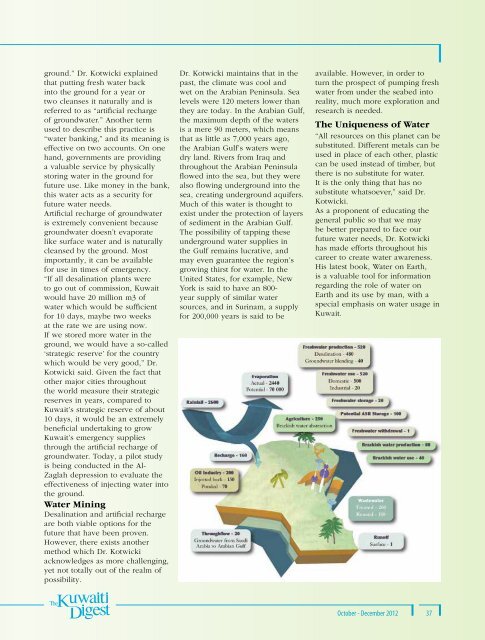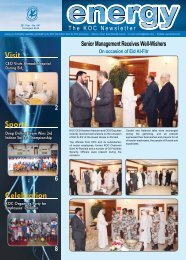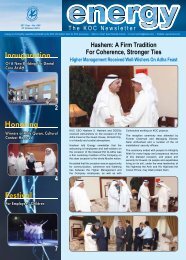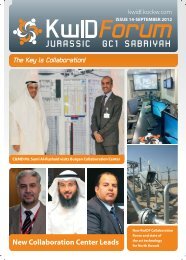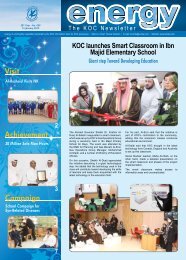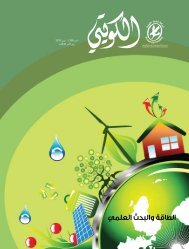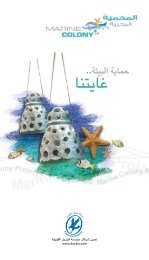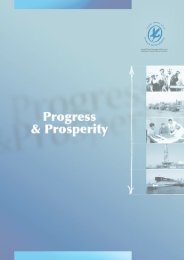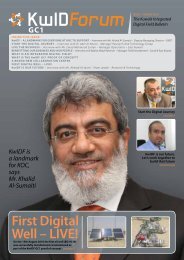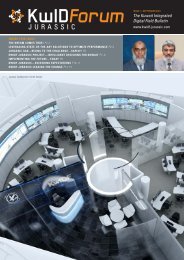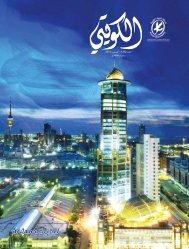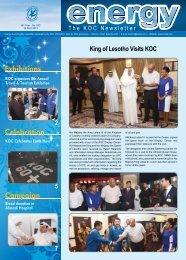4 - Kuwait Oil Company
4 - Kuwait Oil Company
4 - Kuwait Oil Company
You also want an ePaper? Increase the reach of your titles
YUMPU automatically turns print PDFs into web optimized ePapers that Google loves.
ground.” Dr. Kotwicki explainedthat putting fresh water backinto the ground for a year ortwo cleanses it naturally and isreferred to as “artificial rechargeof groundwater.” Another termused to describe this practice is“water banking,” and its meaning iseffective on two accounts. On onehand, governments are providinga valuable service by physicallystoring water in the ground forfuture use. Like money in the bank,this water acts as a security forfuture water needs.Artificial recharge of groundwateris extremely convenient becausegroundwater doesn’t evaporatelike surface water and is naturallycleansed by the ground. Mostimportantly, it can be availablefor use in times of emergency.“If all desalination plants wereto go out of commission, <strong>Kuwait</strong>would have 20 million m3 ofwater which would be sufficientfor 10 days, maybe two weeksat the rate we are using now.If we stored more water in theground, we would have a so-called‘strategic reserve’ for the countrywhich would be very good,” Dr.Kotwicki said. Given the fact thatother major cities throughoutthe world measure their strategicreserves in years, compared to<strong>Kuwait</strong>’s strategic reserve of about10 days, it would be an extremelybeneficial undertaking to grow<strong>Kuwait</strong>’s emergency suppliesthrough the artificial recharge ofgroundwater. Today, a pilot studyis being conducted in the Al-Zaglah depression to evaluate theeffectiveness of injecting water intothe ground.Water MiningDesalination and artificial rechargeare both viable options for thefuture that have been proven.However, there exists anothermethod which Dr. Kotwickiacknowledges as more challenging,yet not totally out of the realm ofpossibility.Dr. Kotwicki maintains that in thepast, the climate was cool andwet on the Arabian Peninsula. Sealevels were 120 meters lower thanthey are today. In the Arabian Gulf,the maximum depth of the watersis a mere 90 meters, which meansthat as little as 7,000 years ago,the Arabian Gulf’s waters weredry land. Rivers from Iraq andthroughout the Arabian Peninsulaflowed into the sea, but they werealso flowing underground into thesea, creating underground aquifers.Much of this water is thought toexist under the protection of layersof sediment in the Arabian Gulf.The possibility of tapping theseunderground water supplies inthe Gulf remains lucrative, andmay even guarantee the region’sgrowing thirst for water. In theUnited States, for example, NewYork is said to have an 800-year supply of similar watersources, and in Surinam, a supplyfor 200,000 years is said to beavailable. However, in order toturn the prospect of pumping freshwater from under the seabed intoreality, much more exploration andresearch is needed.The Uniqueness of Water“All resources on this planet can besubstituted. Different metals can beused in place of each other, plasticcan be used instead of timber, butthere is no substitute for water.It is the only thing that has nosubstitute whatsoever,” said Dr.Kotwicki.As a proponent of educating thegeneral public so that we maybe better prepared to face ourfuture water needs, Dr. Kotwickihas made efforts throughout hiscareer to create water awareness.His latest book, Water on Earth,is a valuable tool for informationregarding the role of water onEarth and its use by man, with aspecial emphasis on water usage in<strong>Kuwait</strong>.October - December 2012 37


